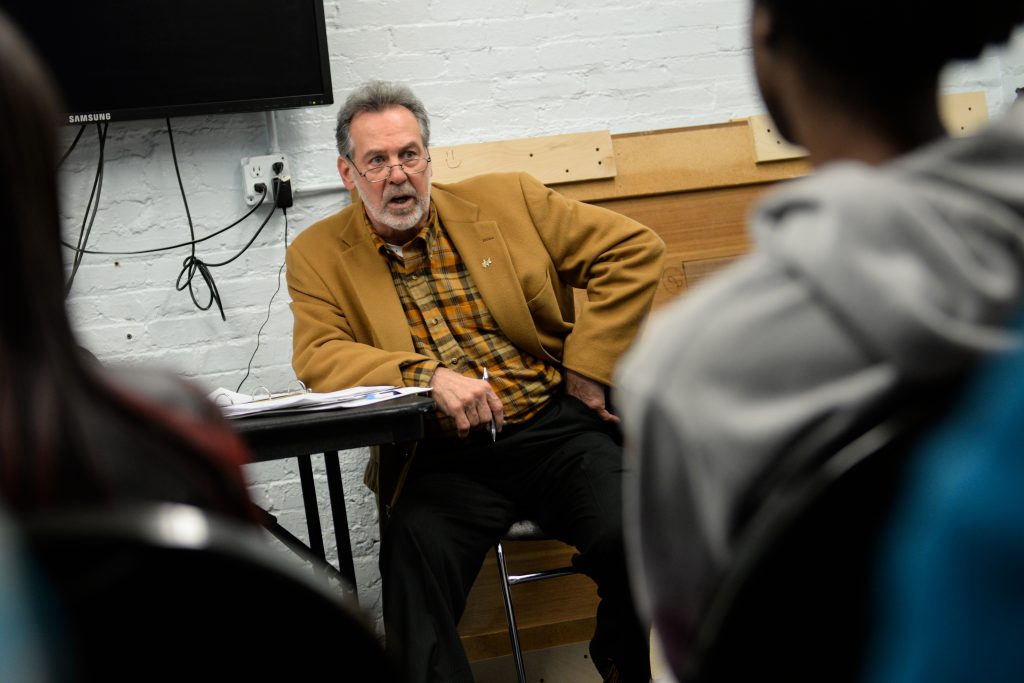Updated: Jan. 31, 2017 at 4:48 p.m.
GW’s longstanding administrator who helped the University establish ties with the local community and government retired in December after 19 years in the position.
During his nearly two decades on campus, Bernard Demczuk, the former assistant vice president for District relations, alleviated tensions with the University’s neighbors, worked to promote GW’s agenda throughout the city and established a community group to negotiate neighbors’ issues. Neighbors and area leaders said his dedication and availability to the community will be missed.
Demczuk declined to say why he retired but said Renee McPhatter, the assistant vice president for government and community relations, will remain in her role.
Demczuk, 69, said he will continue to work with the community through teaching and plans to write a book and a screenplay about Unionville, Md.’s history.
He will continue to be the faculty adviser for the George Washington Williams House and to teach a black history course for the School Without Walls and a black film class at Ben’s Chili Bowl.
“One of my most important contributions was to be a mentor to students – particularly African American students and minority students – and bring them into city issues,” Demczuk said.
University spokesman Brett Zongker said in an email that federal, District, Virginia and community relations are still handled by the Office of Government and Community Relations staff.
“Dr. Demczuk established a strong relationship that GW enjoys with the D.C. government,” Zongker said.
Zongker declined to say how the Office of District Relations has changed without Demczuk and whether the office’s priorities have been restructured after his departure.
Demczuk had collected many awards during his time at GW, including the Dr. Martin Luther King Jr. Award and the GW Award, which is the highest honor the University grants for service. Demczuk also received the Whitney M. Young award in 2013 from the Greater Washington Urban League for his service to the community, according to a University release.
Demczuk first came on board the University’s staff in 1998 after working as the director of intergovernmental relations for former Mayor Marion Barry. He said he was hired because of his political mindset and connections.
He came at a time when many community members and elected officials did not approve of GW’s lack of oversight of loud students, he said. He conducted a poll to find out how true this sentiment was and found that 13 percent of 237 Foggy Bottom residents did not approve of GW.
To alleviate this reputation, he organized a group called FRIENDS – named after the TV show – that continues to meet every month to discuss solutions to neighbor’s problems, like loud parties in apartment buildings and litter on residents’ properties. When the meetings started, residents presented 41 complaints in total, but all of those complaints were soon addressed, Demczuk said.
Demczuk said as relationships improved with elected officials, the University had less trouble getting the necessary approval to build buildings like District House and the future development at 2100 Pennsylvania Ave.
“I think the city looks at the University as an asset, not as a problem,” he said.
Ward 2 Council member Jack Evans, who has known Demczuk for about 35 years, said the two worked on multiple projects together, like moving the GW Hospital to its current location in 2002. In 2014, Demczuk and Evans, along with other officials, unveiled a map of Foggy Bottom businesses.
“Having someone that you know and trust is very helpful, so I think the University benefited from the relationships that Bernard developed over the course of his career,” Evans said.
Evans added he hopes Demczuk’s successor will have the same presence on the D.C. Council, understanding of the community and connection with students.
Patrick Kennedy, the chairman of the Foggy Bottom and West End Advisory Neighborhood Commission, said in an email that he hopes the losses of Demczuk and Richard Livingstone, the former assistant director of community relations who left over the summer, don’t diminish GW’s commitment to community relations.
“Moving forward, this represents an opportunity for the department to realign its mission to be even more collaboration-oriented in dealing with the community,” he said.
Marina Streznewski, the president of the Foggy Bottom Association, said she remembers when she called the D.C. relations office about a snow-covered sidewalk in front of a student house. She later found Demczuk and other officials clearing the sidewalk.
“I know that there’s only one Bernard Demczuk, but I hope that whoever comes after him takes a page from his book in terms of being open, listening and sharing information,” she said.
This post was updated to reflect the following correction:
The Hatchet incorrectly reported that Demzcuk was the vice president for District relations. He was the assistant vice president. We regret this error.





